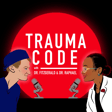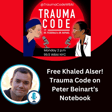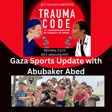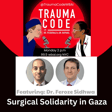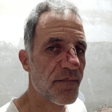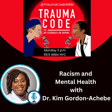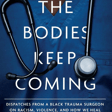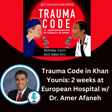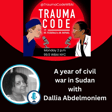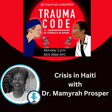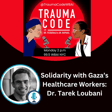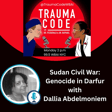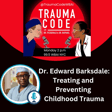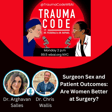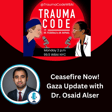Become a Creator today!Start creating today - Share your story with the world!
Start for free
00:00:00
00:00:01

Gaza War and Sports with Abubaker Abed
We call our Gaza correspondent on sports and war, Palestinian jounalist Abubaker in Deir al-Balah. See his ground breaking article describing the life and death of Shaaban Al-Dalou at Drop Site News
Transcript
Introduction and Announcements
00:00:38
Speaker
This is WBAI New York at 99.5 FM and the WBAI.org online. The previous program was the Attitude with Arnie Arneson, her weekdays at 1 PM. Stay tuned for Trauma Code coming up. It's now 2 minutes past 2 PM. Stay tuned.
Dr. Fitzgerald and Dr. Rafael on Trauma Code
00:01:05
Speaker
So,
00:01:59
Speaker
Code to New York City, Trauma Code to WBAI. I am Dr. Simon Fitzgerald, a Brooklyn trauma surgeon and surgical intensivist. And I am Dr. Cassandra Rafael, an adult and child psychiatrist. Welcome to Trauma Code. Together we will focus on healing of mind, body, and community from trauma. We'll discuss how wellness fits into the culture at large. Join us on Monday at 2 p.m. on WBAI.
00:03:39
Speaker
Welcome back to the trauma code. This is Dr. Simon Fitzgerald live and in studio and I took the train today but I misread the timetable so I had to run five blocks down Atlantic Avenue and then up three flights of stairs but I made it. I'm here today in studio with you for trauma code for Monday October what is it the 21st at 2 p
Violence in Gaza: An Overview
00:04:04
Speaker
.m. um and that was just Anadhamni Falastini um and uh wow there's a lot that's been going on in the world and uh we're gonna have i think we're gonna be able to arrange it a guest on our Gaza sports correspondent Abu Bakr Abed we're gonna try to get him on the line in a minute um and he was just on democracy now covering
00:04:29
Speaker
you know the ongoing violence in his hometown of Darabala in southern Gaza more towards central Gaza where one of his contemporaries in the courtyard of alaa hospital was and i guess trigger warning today we're gonna talk about some serious things um but there's video right of this online of a twenty year twenty year old survivor of a previous airt strikeke in a hospital bed in the courtyard of olocha hospital who was hit by incendiary bombs and
00:05:02
Speaker
burned alive um basically on a live stream so that was been covered in courtyard hopefully we'll have on the line in a little bit Abubakar Abed, and you know, why why don't we do this? Let me catch my breath. I had some other stuff to talk about, but let's save that for the end of the show. Let's do a little musical break. Let's see if we can get Abubakar Abed on the line from Darabala Gaza while I catch my breath here in studio for Trauma Code on WBAI in New York City. Thanks for joining us.
00:08:07
Speaker
Welcome back to the trauma code. I just caught my breath. And that was music was what a hour Guzo by the Dalak band recommendation from our friend of the show, Alex galley. And we're gonna call in five or 10 minutes and get our Gaza sports correspondent Abu Bakr Abed on the line to talk about an article he just wrote for drop side new drop site news.
00:08:32
Speaker
Which is really just devastating, and an excellent piece of reporting, so we want to support him and bring him back on the show. um And obviously there is some sports news, right? We're just down the block from the Barclays Center, home of the New York Liberty, ah the current champion WNBA champions. ah The game five last night against Minnesota was a tight game, went to overtime, but New York got the win and definitely I think my wife was saying first New York basketball championship of her adult life or at least recollection and I didn't have a counter argument for that. um So definitely we're excited about that and we've been going to games and we have had on the show a couple of times Terrence Williams a sports
00:09:12
Speaker
journalist, who also works at yeah ESPN. um and So definitely that's something to celebrate, um but of course the ongoing um violence is really just worsening. In Gaza there's reports of really almost liquidation, almost extermination, rounding up masses of people and marching them down the street. In northern Gaza, especially Jabalia, and this seems like just the escalation of the genocidal violence, if you'll Excuse me, and in speaking frankly about it, and that's why we want to get Abu Bakr Abed on the line because, um you know, i I just saw right before I came on the show, excuse me, a picture I think from the social media of Israeli soldiers of Indonesian, I think it was Indonesian or Al-Adha hospital burning.
00:09:55
Speaker
um in northern Gaza and we know that the air strike on ah in Dara Bala that we're going to cover happened in the courtyard of Al-Aqsa Hospital and it's just part of the ongoing systematic attack and destruction um on healthcare care workers, on healthcare institutions and we actually this morning, one of our partners who we've had on the show, Dr.
Regional Impact: Violence in Lebanon and Sudan
00:10:18
Speaker
Osaira Sur, who is a um General Surgery resident in Texas from Gaza was presenting at the major surgical National Surgical Conference, american
00:10:29
Speaker
i the American kind Congress of Surgery, their Clinical Congress this year in California, on our um telemedicine support collaboration with Nasser Hospital in Con Eunice, but um obviously it's just part of really just some work, some solidarity, some evidence-based solidarity um with ah our colleagues, surgeons, trauma teams, physicians, healthcare workers in areas under attack, such as Gaza. So definitely proud of of our work, and in particular Dr. Osaida Sur for presenting today at ACS Clinical Congress.
00:11:08
Speaker
um And, of course, the violence has also really been escalating in Lebanon with large numbers of casualties, entire, you know, apartment blocks, ah just completely collapsed five, six stories from airstrikes, you know, um as as well as in Gaza, many of them with no warning, mass casualties.
00:11:27
Speaker
um And you know, I reached out, we were supposed to have george Dr. George Abi Saad on um early on in the escalation of violence in Lebanon. It wasn't that long ago, but it was thousands and thousands of casualties ago. um and And he's really just lost the motivation and the interest since there's so little um response to stop this mass casualty, this you know not this intentional violence, um non-accidental violence, just ah killing masses of people in Lebanon. So we're hopeful to get some Lebanese colleagues on to talk about what they're going through, um but
00:12:03
Speaker
The burden is a lot right now. And one thing I do want to announce, i' I'm looking forward to our Sudan correspondent, Dahlia Abdelmonaim, who we've had on at least two or three times. He's planning to be on next week to talk about updates on the situation in Sudan, in you know is from Khartoum to Darfur um and Al Jazeera state, a lot to talk about interesting things. So we're really looking forward to that.
00:12:29
Speaker
But why don't we do this? Let's take another musical break and we'll see if we can get um Abu Bakr Abed um' on the line with us. And if not, we'll talk a little bit more and have a little bit more music while we connect ah with our friend and colleague in Gaza, the sports journalist turned war correspondent Abu Bakr Abed. Be right back with you.
Gaza Conflict: Personal Accounts and Global Response
00:16:01
Speaker
Welcome back to the trauma code. That was just, what was that? Oscora primavera by Khan, another recommendation by our a friend of the show, um Alex Gallian and Abu Bakr Abed said he'll be available in five minutes. Obviously there's some difficulties in trying to connect.
00:16:20
Speaker
to Gaza right now so we'll give him five minutes um and you know while we do that Reggie why don't we set up um you know Abu Bakr Abed was actually on democracy now I think yesterday um about this piece that he wrote um which was a about the the death and the life of Shaba Adalu a engineering student who had just started his higher education in September before um the escalation of violence in October and so he never really got a chance to complete his studies and ended up dying in an airstrike strike displaced from Gaza City into Darabala in the courtyard of Al-Aqsa hospital and ah
00:16:58
Speaker
What um the democracy now showed to their credit, where as it was able to find and to play, was a recording of Shaban al-Dalu from I think a month or two ago, ah where he talks about his situation, trying to raise money to support um you know the the impromptu refugee shelters that he was living in when he was ultimately attacked.
00:17:18
Speaker
So let's, I want to just play a minute of of ah democracy now, I think from yesterday. um Just starting at that 46 or 4612, Reggie, are we ready to go? Let's play a little bit of this Shaban al-Dalu telling you about his situation before he was unfortunately killed in an airstrike on Al-Aqsa Hospital in Daraballah, Gaza this past week.
00:17:37
Speaker
From the tent where we reside, I'm Shabbat, I'm 19 years old. I'm a student studying software engineer. In this barbaric starvation war, we have displaced five times so far. Now we are in Al-Aqsa Marjia Hospital in the middle of Gaza, Dereel Balakh. I'm taking care of my family as I'm the oldest.
00:17:55
Speaker
We have two sisters and two little brothers and my parents. We live in a very hard circumstances suffering from various things such as such as a homelessness and limited food and extremely limited medicine. And the only thing between us and the freezing temperature is this tent that we constructed by ourselves.
00:18:26
Speaker
well so that was a just a little bit uh... shaban although uh... and we're gonna have on uh... the uh... the palestinian journalist abu akbar by abed will call in a minute about um what is going on uh... right now in the work that he did for drops i knew sorrows looking for the title is articles not in front of me but it's really devastating i encourage you to go look it up uh... and we of course it had him on previously Uh, because his, you know, he is also a student of journalism with an interest in sports and football in particular, his in a previous life, you know, for someone so young, uh, in a previous life, he was a, a, a football announcer and a sports commentator. Uh, and you know, the, since we had him on last, we'll see if we have some time to talk about football, the Palestinian national team.
00:19:16
Speaker
uh achieved a uh draw against I think Kuwait uh and a loss against um I think Jordan and Iraq since the last time that we were on uh some strong teams so they have to beat I think they have to beat Oman at least once if not twice uh or one of the other teams that they haven't been able to beat I think they each play each team in their division twice for the Asian World Cup qualifiers. So um definitely something that we'll look forward to. And I think there are games in November if we have a chance to talk to Abu Bakr Abed about that. A journalist from Gaza, we're going to have on the line talking about Shaban Adalu, a 19 or 20-year-old. I guess he would have been 20-year-olds yesterday, the day before, but he was killed before he could reach his 20th birthday in an airstrike on Alakza Hospital in Darabala, Gaza.
00:20:06
Speaker
So why don't we do this? let's um We're going to have a little music break in a minute, but ah first while we have you on the line, while we're trying to connect with our Gaza sports correspondent and war correspondent Abu Bakr Abed and Daraballah, I just want to take the moment ah to thank you for your support And you know to to point out, I don't think there's another way that I would realistically have the broadcast, have the reach to get a journalist on the line from Gaza to give a live interview to New York City without the legacy, without the reach, without the broadcast of WBAI and our studios in downtown Brooklyn. And you know part of keeping that going is paying the bills. So definitely, if you appreciate us,
00:20:48
Speaker
We appreciate you and you can give to support the show and to support the work, be able to have some money on the Skype account to get people online or however we need to do it to ah reach ah people across the world and around the city and to the five boroughs. So definitely go online at www.wbai.org or give to www.wbai.org.
00:21:08
Speaker
I guess we're not doing the pledge line anymore right now, but realistically, if you can find us online, we definitely appreciate um your
Supporting WBAI and Trauma Code
00:21:16
Speaker
support. And you can find trauma code if you catch just part of this episode or want to hear a previous episode I mentioned. You can find our work on the WBAI radio archives under trauma code, but also wherever you get your podcasts.
00:21:30
Speaker
at trauma code the the rs what is it RSS feed you can find and we're on social media at trauma code WBAI and you can reach us on email at trauma code WBAI at gmail dot.com ah with any um Any questions or interests or comments or music recommendations, I'll take them. So why don't we do this? Let's take a little musical break and try to get our Gaza sports correspondent and war correspondent Abu Bakr Abed on the line from Dar al Bala Gaza. We'll be back in a minute on New York City or listening to Trauma Code on WBAI.
00:25:08
Speaker
Welcome back ah to the Trauma Code. We're having a little bit of difficulty connecting with our Gaza sports correspondent and war correspondent Abu Bakr Abed. Why don't we play one more song. We'll try S.C. Roji. Please go easy on me while we try to get Abu Bakr Abed on the line. You're listening to Trauma Code on WBAI in New York City. Stay tuned.
00:25:41
Speaker
Now we step and go east.
00:26:29
Speaker
I don't love you.
00:27:18
Speaker
I don't love you when you're holding my hand
00:27:52
Speaker
It's true that the music is sweet What can make it be a release?
00:30:27
Speaker
I don't love you when you're holding my hand
00:31:07
Speaker
Welcome back to The Trauma Code and we have on the line Abu Bakr Abed, our Gaza ah correspondent on both issues of war and sports. Abu Bakr, can you hear us? Are you with us? I can hear you.
00:31:23
Speaker
Excellent and obviously it's a difficult connection to Daro Bala and you know we had just played um from what was played on Democracy Now the other day a recording of ah what was his name Saban Aldalo, a recording that he made to raise money to support his family as refugees in Daro Bala.
00:31:44
Speaker
before he was sort of tragically and graphically um killed in front of Al-Aqsa Hospital. So first of all, I want to say I really appreciate the work you did, the article you wrote in Drop Side News, and I'm very grateful to have you on the line. Thank you for joining us.
00:31:58
Speaker
ah is so me and And the connection is a little bit difficult, but it means so much to me, and and I hope our listeners to be able to connect.
International Intervention and Policy Critique
00:32:09
Speaker
um And I encourage everyone to read the article from Drop Site News. um Anything that that you wanted to say that was really important in covering about the life and death of Saban Aldalo?
00:32:24
Speaker
say It was just like, I don't know what what else can i I can say. and you When everyone around the world saw and watched the footage of him burn alive, burning alive and engulfed by flames inside his makeshift tent, the elaborated tent,
00:32:50
Speaker
and I don't know what else I can say, but all I can say is that this innocent soul has just been brutally taken in and the most horrific shape. definitely He didn't have anything to know to do with this war. He was yeah absolutely traumatized even before his killing. He was wounded as well.
00:33:15
Speaker
um he was wounded as well and then I don't know like even he was not sound when he was killed or burnt alive but rather he was injured and he had and his head was stitched up by like 20 stitches so the killing of Shabaan only represents one thing which is the uh which is the you know the unspeakable horror
00:33:47
Speaker
ah or inflicted on us during Gaza. Because he's an innocent man, young man. He has nothing we do to do with this. He had nothing to do with this war. He least he could really dream of. He dreamt of having some mango tea, a fair atmosphere of beauty.
00:34:14
Speaker
He loved the event of getting back to his normal life, he dreamt of getting back to his home, his demolished home, he dreamt of completing his status at his demolished university, which is incredibly horrible.
00:34:30
Speaker
you're You're coming and going, but i i will i what I did want to um thank you for in your reporting your empathy and the way you humanize this person and you know showed really what his life and dreams were, which is what you were just describing to us, that he was a university student studying engineering. Even as a refugee, he was building sort of the tent community.
00:34:50
Speaker
um and and ah had been displaced, I think, five times, he says, ah from his home in Gaza City, which was in rubble. um And he had already been injured in attacks on civilians um and was had an IV in his arm on sort of a hospital bed in the courtyard of an overfilled hospital.
00:35:08
Speaker
um And there's just obviously this isn't the first genocide that the world has ever seen in a way, but there's also a way in which it is the first one that has been kind of live streamed. And and um that I think ah is really a lot for the world to see, and and I appreciate how you also let us see who this human was and feel the sense of loss that that the community um definitely feels the lost potential.
00:35:34
Speaker
um So you know and I think the other point that you made is that you, and in a a lot of ways, um you know see yourself in him. And hopefully our audience can see himself in him as well, someone who's trying to be educated, trying to do important work, him as an engineer and you as a journalist. But facing really this unrelenting, no other word to call it but genocidal violence that's being broadcast in real time around the world, ah yet is still being armed and funded by the United States, and there's no power that's strong enough to stop it willing to step in yes you you're right you know you said it yourself that this is the first live scene genocide in front of millions of people three heads from inside when you are unable to win the entire world is unable to bring one bottle of water to two million people being exterminated and tortured and also starved
00:36:31
Speaker
So I don't know what the world is waiting for to intervene and act, but this sort of complicity from the governments and from love people across the globe is making things more difficult and is is dashing our hope that this genocide will end.
00:36:53
Speaker
Because, you know, that was Shabban and then other people were killed today. Many people were killed. The Koshkaz are at least 50 people. Every day people are being killed en masse and there's no one saying a word. The hospitals are too overcrowded with, you know, are crammed with patients and those people.
00:37:18
Speaker
And an entire population is being staffed at the moment. They can't find food, they can't find anything because Israel has been blocking the two crossings for the past two weeks. But yes, the world is happy with it. The world doesn't care about Palestinian people here.
00:37:40
Speaker
Because if it car if this word cared about us, it would end from the very first massacre back in the beginning days of October when the Arab hospital massacre happened where 500 people were killed and more than 1,000 were wounded.
00:37:57
Speaker
And so you you cut you cut in and out for a moment, but I think the last thing you said was really important about the Ala Ali Hospital bombing, um also called Baptist Hospital, in October. I think it was October 17th. From then on, it was clear that, um and and this has resonated with me, particularly as ah a health care worker as a trauma surgeon, just the the just systematic attacks and destruction of ah health care workers and health care infrastructure. And you're right, the the burning alive of Saban, Aldalo is the expected result of tolerating and arming and um funding the ongoing violence, the escalation of violence after the bombing a year ago at Al Ali Hospital.
00:38:40
Speaker
um And of course, it's not even just in central of Gaza or the north of Gaza, but also um the war, the violence, the killing is expanding in the West Bank and as well in southern Lebanon. um So I i agree and and I feel that sense of urgency, and but I appreciate the the way that I think you're reporting is really important in seeing the world um and having feet in Gaza when we're not allowed to even, as you said, pass a bottle of water across the border.
00:39:09
Speaker
um Anything else that you want to say while you have the ear of New York City ah about the killing of Salman Adalu and the escalation of violence in Gaza? The thing I want to address to people there is that, I mean, I know that your governments, your leaders, your president does not present you. I know that they are completing the genocide they are allow for this it's empowering and dismembering people and something here.
00:39:43
Speaker
I know that you don't like them, we just want you to continue, continue doing your part, continue that for the new because there is no way to stop it unless you pressure your governments to do something and intervene and stop the genocide because this is a genocide that is perpetrated by the US, the European Union and and even the Arab world. So for those people I know we appreciate your support, we appreciate your love,
00:40:12
Speaker
But I need you. I personally need you. We need you here. This has been for more than a year. We are being killed, we're being maimed, we're being starved, we're being tortured, we've we're being traumatized, we're being terrorized, and everything, sort of this suffering. If you really want to stop it, you have to sacrifice. And if you you must be honest with yourself.
00:40:39
Speaker
are you going to really intervene instead of the genocide, then I have to tackle my government. i have We have to make a global protest, a global protest against our governments, just to try to, like for example, the Israeli embassy in the US, the Israeli embassy everywhere around the world, just to try to encircle this embassy and protest in front of it, so that it can make a difference. But unless you are just watching us being killed on social media and being named every single day,
00:41:08
Speaker
then what will change? Look, we are what we've been reported for the past 12 months and more, and then nothing has changed. So our words don't no longer, no longer make a difference, no longer pay off. What really pays off at the moment is your real actions on the ground. If you're happy with wiping out a full generation, full population of too many people, then stay sad and just keep watching.
00:41:36
Speaker
behind the screens, but they keep talking about us. We've been talking, you've been talking about us for more than 12 months and we are entering the 13th month. ah Nothing has changed. It's like looking at the people that we are suffering. It's so windy outside. It's autumn here. Many people, thousands of people, almost all people are trapped in tents. They don't have anything to do with this world. They don't have ah anyone took lots, you don't have any means of life. How can they really resist to that? I mean, such incredibly harsh times and and the genocide then under, you know, under this kind of circumstance, these kinds of circumstances. if i and if i may And if I may Abu Bakr, I definitely agree with you and appreciate your point that when we know what's going on and so much funding and weaponry is you know both made in finance in the United States, the artillery, the ammunition, there's literally pouring jet fuel on this genocidal violence. I think every death in Gaza right now is an American policy. um you know it's the It's the result of American policy and it's the choice, an American political choice. so i definitely
00:42:43
Speaker
agree if we understand that that's our burden, right? if If we agree with that and continue to pay without trying to stop it, we are complicit even I think in a sort of ah certainly moral if not legal liability sense with an understanding of the history of the conventions on the the violence of genocide.
00:43:01
Speaker
So definitely I think it's a coming upon us. And that's why I think for me, it's so important to make that part of my work to end the violence. You know, I come from a tradition of ceasefire in a community with way too much violence in Baltimore. And we know that the way to stop the violence is to stop arming the belligerents. And 100% I think a priority for anyone who wants to engage in the political sphere, ah even just the public health sphere, is to demand an arms embargo to stop stop arming the genocidal violence or otherwise we are participating in the killing in the violence, uh, like that you, um, have so well captured for drop site news about Siobhan Aldalo. Um, you know, uh, Abu Bakr, you're a sports correspondent and i I want to give you a chance to talk about if you're interested in, in, in sports and things that you love in football, uh, anything that you want to say before we change the topic towards the topic of football that you and I have been communicating about on and off for several months.
00:44:02
Speaker
What I just want to say is, I mean, there has been another player killed last week. He is just a promising 21-year-old player. His family was wiped out last week in Hangarness in southern Gaza.
00:44:21
Speaker
and see what's happening. It's, you know, now more than 350 football players killed in Gaza, more than 550 athletes murdered, and it just keeps going on. It's just like they have just attacked the already damaged Palestine Stadium in Gaza City.
00:44:46
Speaker
And there's no way from anyone. I've been reporting on the sporting tragedy for more than a year. I've seen nothing. FIFA has not changed its stance on the continuous Israeli crimes against sports in the BC territory.
00:45:03
Speaker
and It just keeps going on. So I don't know what else I can say, what else I should report. So this madness can stop. So this insanity can stop. But it seems quite unfeasible that FIFA can really do something. But it just keeps postponing all its cancers when it comes to Israel because It seems that Israel is feeding FIFA and is is is, you know, I mean, Israel has something to do with FIFA when it just keeps turning a blind eye to what is happening in Gaza. So it's and really unbearable what we see.
00:45:38
Speaker
And we obviously know FIFA has a long history of corruption um that's well documented, including in places like Russia and and Qatar. But obviously, I think what you're saying is almost certainly true. um But ah in addition, there's a way in which watching Palestinian football right now, there is a sense of magic and how the team is punching above its weight.
00:45:57
Speaker
um But there's also, I don't know if it's a sense of of urgency for sure and and and moments almost desperation because, as you mentioned, so many footballers have been killed, so much football infrastructure has been destroyed. If you're not um if you're Palestinian and not competing internationally right now in football,
00:46:15
Speaker
ah Right, you're in no position to get appropriate training, get appropriate nutrition, get appropriate opportunities to compete. um And so there's just the way there's a lost generation in healthcare, care there's a lost generation in football right now, I think. um Anything else that you want to say in in what watching the Palestinian national team means right now from Darawala in Gaza?
Sports and Conflict: FIFA's Role and Accountability
00:46:40
Speaker
We were watching last time, like the game, the draw against Kuwait, and then they lock against joy against the Jordan Iraq. Jordan and Iraq, yeah. Yeah. And then, ah I mean, it just... sixty s I know a bit about this person in particular, it's been spent, as I told you, in the previous time, but...
00:47:04
Speaker
We're still so much connected with football, as you said, because I saw, like, I posted that on Twitter yesterday the day because I saw a couple of teenagers, only 16 years old yesterday. They were passionately cheering on Liverpool yesterday in their game against Chelsea.
00:47:22
Speaker
And it was night here. So when you saw that when you see that those young men and those youngsters cheering on their favorite teams despite the harsh nightmarish circumstances unfolding in the territory, then why FIFA is not giving us a look? Why is FIFA not crediting us or praising us or talking about us?
00:47:46
Speaker
Even the Western sports newspapers, they are complicit in genocide. No one has talked about anything. maybe To be honest, this dude from Sky News is just talking about the genocide happening here. But no one is talking about our stadiums and the massive destruction of sports and this decimation of sports. It just keeps going on. It's actually unbearable as I told you.
00:48:15
Speaker
Definitely. And you know we're we're ah good friends with the sports journalist, ah Dave Zirin, who's covered this. And I definitely agree with you. And it needs more attention um that ah while ah ongoing crimes of genocide, killing civilians, destruction of ah footballers, and and the football infrastructure continues in Gaza, um you know just as the South African teams had ah to be prevented from competing internationally during apartheid, I think definitely a campaign ah to pressure the exclusion of the Israeli team until there is a cessation of violence from the Israeli government, I think um makes total sense to me. And I think, you know, there is a redemption story, right, in South African football, ah rather than South African rugby after the end of apartheid.
00:49:05
Speaker
and i And I would hope to have that kind of redemption story in the future but it doesn't happen without demanding accountability and demanding a cessation of violence. So we're definitely big supporters of the Palestine National Team and happy to have you on the radio Abu Bakr Abed. We're running towards the end of our show and I'm very grateful for you for joining us and I know it's difficult connection. Anything else you want to say while you have the ear of New York City? I just want to say that this thing to to the Western community, which is that a story like Shaban, if Shaban was Ukrainian, if he was of another citizenship, then the world If Shaban as a Ukrainian was killed in that way, it would have shaken the world.
00:49:53
Speaker
Yeah, exactly. That's what I mean. It would erupt, which would be shocking because this is the complicity in the double standard. under the both standards of the wisdom give me And it's one of the main reasons why we are suffering, honestly.
00:50:10
Speaker
So, and even for me, like, everybody outside, I was just told by a journalist in the West, and he told me that Western European, Western post-journalists know you, know that you are from Gaza, and you're doing your best, and no one cares. Imagine that I'm a worker respondent now, a forcibly worker respondent, and no one talks about me, but a story like me elsewhere, if I were recruiting, if I were of any other nationality, then everyone would be like a worker,
00:50:40
Speaker
You are the story, you are here, you are, you are, you are, you are, you are, et cetera, et cetera, et cetera. That is the peak and pinnacle of dehumanization and looking at other people with a sense of racial hierarchy. So this is the point that most tell people. So forget about your governments, keep supporting us. We see hope in you. We love you.
00:51:06
Speaker
And just do your best because we are being killed every and every day. We love you. We send in our love and hope to every single one of you. Well, I love having you on Abu Bakr. And I know as a a football correspondent, as a sports journalist, you're hoping and looking forward to being able to just participate.
Conclusion and Listener Support
00:51:27
Speaker
ah excuse me in the world cup games uh... in uh... north america so if so i definitely hope look forward to hoping to see you there and in the meantime uh... we're hopefully at wb a i gonna be able to continue to support you and and read your work and everyone definitely for just joining us on trauma code we have on the line finishing up abubaker abed who just published a piece for drop site news about the killing of saban adalo in darabala in gaza uh... our favorite uh... gaza sports correspondent and a sort of accidental war correspondent. We appreciate you work your work Abu Bakr and we'll be in touch.
00:52:02
Speaker
thank you so much thank you all the best all right Reggie why don't we have a little um musical break but we're going to be wrapping up the show and and i guess now is as good a time as any to remind you this is trauma code on wbai and if you appreciate us go online at www.bai.org support the station so we can do what we can do so we can call our our gaza sports correspondent and get them on the line in darabala and again if you have any interest in trauma code you can find us on the WBAI radio archives or trauma code WBAI on all your social media or send us a message trauma code WBAI at gmail dot.com Thank you for joining us, New York
00:53:45
Speaker
um Good afternoon. For WPFW Washington and WBAI New York, I'm Darnia Samuels. Here's some headlines for this hour.

